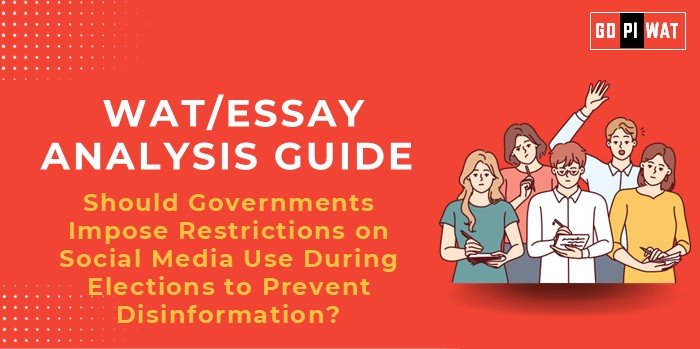📋 WAT/Essay Analysis Guide
Topic: Should Governments Impose Restrictions on Social Media Use During Elections to Prevent Disinformation?
🌟 Understanding the Topic’s Importance
Social media’s influence on elections brings unparalleled opportunities for engagement but poses risks of disinformation. A well-balanced essay on this topic should evaluate the tension between regulation and democratic freedoms.
📝 Effective Planning and Writing
- Time Allocation:
- Planning: 5 minutes—outline arguments and evidence.
- Writing: 20 minutes—focus on clarity and logical flow.
- Review: 5 minutes—check coherence and grammar.
- Structure Overview:
- Introduction: Brief context with a strong opening line (60-70 words).
- Body Paragraphs: Arguments with examples and analysis (350-375 words).
- Conclusion: Balanced perspective or global comparison (60-70 words).
✍️ Introduction Techniques
- Contrast Approach: “While social media democratizes information, its misuse during elections threatens democracy itself.”
- Case-Based Introduction: “The 2016 U.S. Presidential Election exposed the global risks of unchecked disinformation on social media.”
📂 Structuring the Essay Body
- Achievements: Highlight instances of effective moderation, like Facebook’s election monitoring tools.
- Challenges: Discuss government overreach risks, comparing democratic and authoritarian contexts.
- Future Outlook: Suggest cooperative frameworks between governments and platforms.
📈 Concluding Effectively
- Balanced Conclusion: “Regulating social media during elections is critical but must respect free speech to maintain democratic ideals.”
- Global Comparison: “Adopting a balanced approach, as seen in Germany’s laws, could inspire other democracies.”
📊 Analyzing Successes and Shortcomings
- ✅ Key Achievements: Improved content moderation, greater voter awareness.
- ⚠️ Ongoing Challenges: Enforcement limitations, freedom of expression concerns.
- 🌍 Global Context: Germany and Singapore provide regulatory templates.
🌟 Recommendations for Sustainable Progress
- Establish independent oversight bodies for real-time moderation.
- Strengthen collaborations with platforms for transparency.
- Introduce AI-driven tools for identifying harmful content.
📌 Sample Short Essays
- Balanced Perspective: “While regulating social media ensures fair elections, overreach can stifle freedoms. A balanced regulatory framework is the need of the hour.”
- Solution-Oriented: “Creating AI-driven solutions to combat disinformation can enhance both freedom and security during elections.”
- Global Comparison: “Germany’s laws offer a roadmap for regulating social media effectively without compromising democratic freedoms.”


